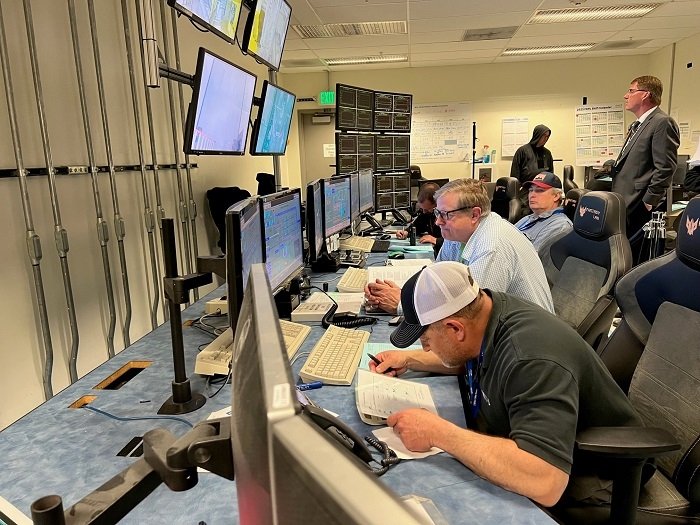
IWTU operators prepare to introduce radiological sodium-bearing liquid waste into the facility Tuesday. (Photo: DOE)
More than a decade after construction was declared completed, Idaho’s long-delayed Integrated Waste Treatment Unit (IWTU) has begun radiological operations, the Department of Energy’s Office of Environmental Management (EM) announced.
On Tuesday, crews at the Idaho National Laboratory Site began sending radioactive sodium-bearing liquid waste from nearby underground tanks to the IWTU for treatment. The 900,000 gallons of waste was generated during decontamination activities following spent nuclear fuel reprocessing that ended in 1992.
The IWTU uses steam reforming fluidized-bed reactor technology to convert liquid waste to a granular solid resembling coarse sand more suitable for long-term disposal.
Background: To meet a 1995 agreement with the state of Idaho, DOE-EM awarded a contract to design and build the IWTU in 2005. Construction was completed in 2012, but a malfunction occurred soon after testing began, revealing problems with the facility’s design.
In 2016, Fluor Idaho was awarded a contract to identify and fix the problems and test the plant prior to radiological operations. Major problems centered on waste fluidization issues, the possible early failure of the plant’s primary reaction vessel, the plugging of gas filters, and the ability for operators to decontaminate and access plant components.
Most recently, the IWTU was shut down in December after operators noticed a small leak of nonradioactive material inside one of the unit’s processing cell during startup activities.
Next steps: According to DOE-EM, the IWTU initially will treat a blend that is 10 percent sodium-bearing waste and 90 percent simulant. The blend will later contain 50 percent waste and 50 percent simulant before it eventually becomes 100 percent sodium-bearing waste based on the plant’s operating conditions.
Following treatment, the granulated waste will be stored in stainless steel canisters within concrete vaults at the IWTU. Ultimately, the waste will be disposed of at a national geologic repository.
DOE-EM said that it will share all operating data with the Idaho Department of Environmental Quality as part of the IWTU’s operating permit requirements. Later, IWTU crews will initiate a system performance test to demonstrate compliance with established performance standards and determine adequate operating conditions under the permit.
He said it: “Our employees have worked holidays and weekends, sacrificed vacations, and literally spent all of their waking time supporting the IWTU,” said Ty Blackford, president of the Idaho Environmental Coalition, which in 2021 was selected by the DOE to manage cleanup operations at the INL Site. “I’m so pleased that those who dedicated so much of their careers to the IWTU get to enjoy this monumental moment.”